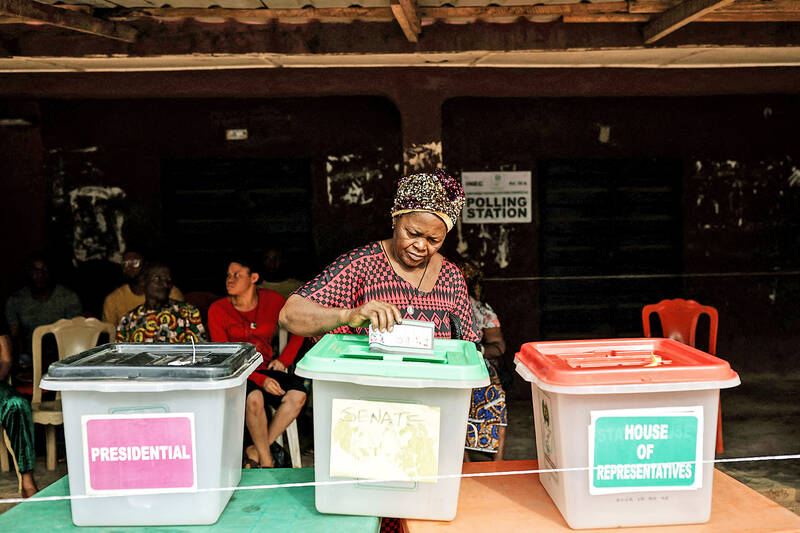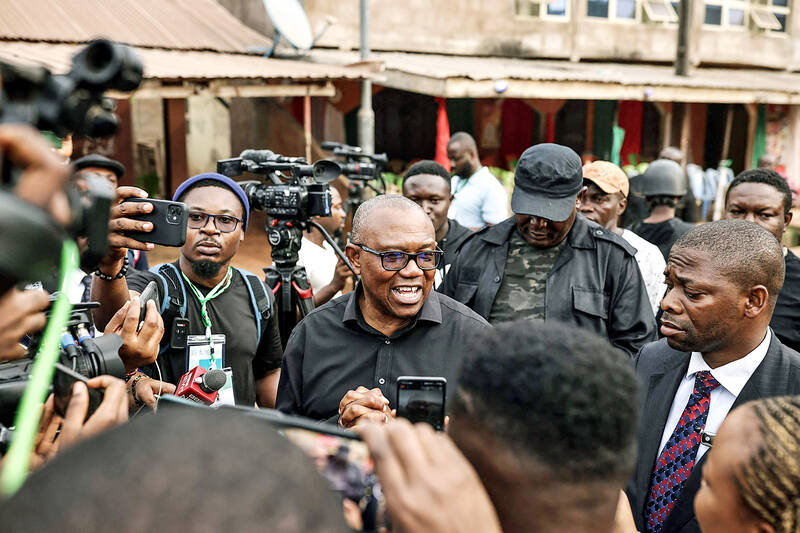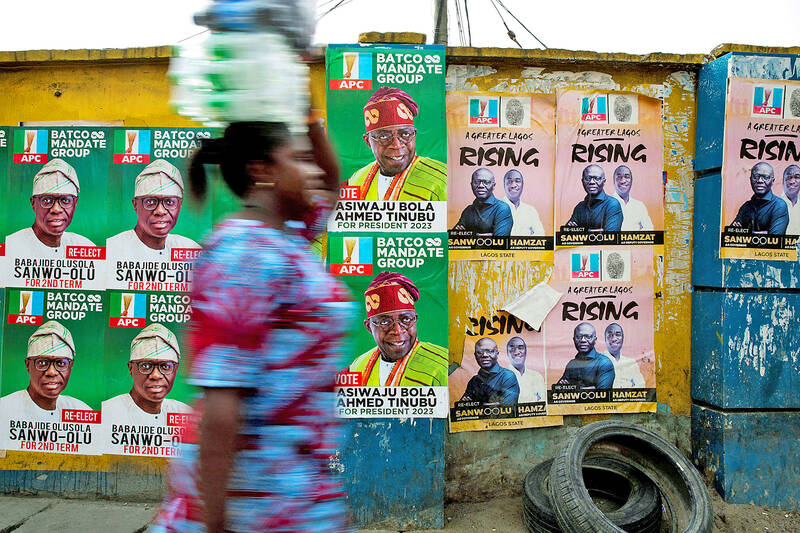Nigerians voted yesterday for a successor to Nigerian President Muhammadu Buhari in a tightly fought race dominated by three political veterans.
Nearly 90 million people were eligible to vote in the poll, which unfolded as Africa’s most populous democracy grapples with a security crisis, a sluggish economy and widening poverty.
For the first time in Nigeria’s modern history, a third candidate has emerged to challenge the ruling All Progressives Congress (APC) party and the main opposition Peoples Democratic Party (PDP).

Photo: AFP
“It’s going to be different this time, we have three people,” said Friday Ikwuako, 55, a school employee waiting to vote in Lagos’ affluent Ikoyi District. “We want a change in government.”
Polling stations were meant to open at 7:30am, but election officials had still not arrived or voting machines were not in place at numerous polling stations visited by Agence-France Presse in Lagos and in southern Port Harcourt and northwestern Kano.
With Buhari stepping down after two terms in office, APC presidential candidate Bola Tinubu, 70, a former Lagos governor and political kingmaker, said: “It’s my turn” for the presidency.

Photo: AFP
He faced a familiar rival — PDP candidate and former Nigerian vice president Atiku Abubakar, 76, who is on his sixth bid for the top job.
However, the emergence of a surprise third candidate appealing to young voters, the Labour Party’s Peter Obi, 61, threw the race open with his appeal for change from his old-guard rivals.
Nearly 10 million new voters registered this year, most of them younger than 34, representing an essential bloc if they came out to vote.

Photo: Reuters
“It’s a very important election because we need a total change,” 61-year-old fashion designer Titus Ojewale said as he waited to vote in Lagos’ Yaba District. “We need a leader that will be able to help our youth to show their creativity, to make the economy move forward.”
Cash and fuel shortages in the days before the election have left many Nigerians angry and struggling more than usual in a country already hit by more than 20 percent inflation.
Voters also cast their ballot for Nigeria’s two houses of parliament, the National Assembly and Senate.
The Nigerian Independent National Electoral Commission has given no timeline for results, but votes are expected to be tallied within a few days.
Under a law implemented last year, the official results have to be confirmed within 14 days.
To win the presidency, a candidate must get the most votes, but also win 25 percent in two-thirds of Nigeria’s 36 states.
If no candidate wins, a runoff would take place within 21 days between the two front-runners, an unprecedented outcome that some analysts say is a possibility this time around.
“It’s difficult for us to make an easy prediction as to what is going to be the likely outcome,” Kano State College public affairs lecturer Kabiru Sufi said.
The rules reflect a country almost equally split between the mostly Muslim north and predominantly Christian south, and with three main ethnic groups across the regions: Yoruba in the southwest, Hausa/Fulani in the north and Igbo in the southeast.
Presidential elections have in the past often been marked by violence, ethnic tensions, vote-buying and clashes between supporters of rival parties.
Voting also often falls along ethnic and religious lines. This time, Tinubu is a southern Yoruba Muslim, Atiku is an ethnic Fulani Muslim from the northeast, and Obi is a Christian Igbo from the southeast.
In 2019, hours before polls opened, the election commission postponed the vote by a week because of problems delivering election materials.
Today, most experts see the commission as being more prepared.
It has introduced biometric voter IDs to help prevent fraud, and results were to be transmitted electronically.
About 400,000 police and troops were to be deployed around the country to protect the vote.
However, security challenges were vast.
Militants operate mostly in the northeast, bandit militias control rural communities in the northwest, and separatist assailants have targeted election commission offices and police in the southeast.

Kehinde Sanni spends his days smoothing out dents and repainting scratched bumpers in a modest autobody shop in Lagos. He has never left Nigeria, yet he speaks glowingly of Burkina Faso military leader Ibrahim Traore. “Nigeria needs someone like Ibrahim Traore of Burkina Faso. He is doing well for his country,” Sanni said. His admiration is shaped by a steady stream of viral videos, memes and social media posts — many misleading or outright false — portraying Traore as a fearless reformer who defied Western powers and reclaimed his country’s dignity. The Burkinabe strongman swept into power following a coup in September 2022

‘FRAGMENTING’: British politics have for a long time been dominated by the Labor Party and the Tories, but polls suggest that Reform now poses a significant challenge Hard-right upstarts Reform UK snatched a parliamentary seat from British Prime Minister Keir Starmer’s Labor Party yesterday in local elections that dealt a blow to the UK’s two establishment parties. Reform, led by anti-immigrant firebrand Nigel Farage, won the by-election in Runcorn and Helsby in northwest England by just six votes, as it picked up gains in other localities, including one mayoralty. The group’s strong showing continues momentum it built up at last year’s general election and appears to confirm a trend that the UK is entering an era of multi-party politics. “For the movement, for the party it’s a very, very big

A new online voting system aimed at boosting turnout among the Philippines’ millions of overseas workers ahead of Monday’s mid-term elections has been marked by confusion and fears of disenfranchisement. Thousands of overseas Filipino workers have already cast their ballots in the race dominated by a bitter feud between President Ferdinand Marcos Jr and his impeached vice president, Sara Duterte. While official turnout figures are not yet publicly available, data from the Philippine Commission on Elections (COMELEC) showed that at least 134,000 of the 1.22 million registered overseas voters have signed up for the new online system, which opened on April 13. However,

ENTERTAINMENT: Rio officials have a history of organizing massive concerts on Copacabana Beach, with Madonna’s show drawing about 1.6 million fans last year Lady Gaga on Saturday night gave a free concert in front of 2 million fans who poured onto Copacabana Beach in Rio de Janeiro for the biggest show of her career. “Tonight, we’re making history... Thank you for making history with me,” Lady Gaga told a screaming crowd. The Mother Monster, as she is known, started the show at about 10:10pm local time with her 2011 song Bloody Mary. Cries of joy rose from the tightly packed fans who sang and danced shoulder-to-shoulder on the vast stretch of sand. Concert organizers said 2.1 million people attended the show. Lady Gaga